|
History menu >
Great Malvern Cemetery
Tour 4
Memorials recorded in May and July 2016. Click to return
to Menu of
tours
In May 2016 we visited the cemetery, on behalf of another
historian, to find and photograph the memorial to Victor William Price RAF who
died in 1917, and while we were there we looked for the memorial to
architect Edmund Wallace Elmslie, created by sculptor William Forsyth, which had
featured in an article in the May issue of the Newsletter of Malvern Museum.
We returned in July 2016 to search for the memorial to
water cure doctor Thomas Rayner MD and, while there, we looked for memorials
to Rev William Grundy, headmaster of Malvern College, Archibald Weir MD who
lived at St Mungho's now Elmslie House on the corner of Albert Road and
Avenue Road, and photographer Norman May, whose burials we had
recently transcribed from the burial register of the cemetery for the Malvern Family
History Society.
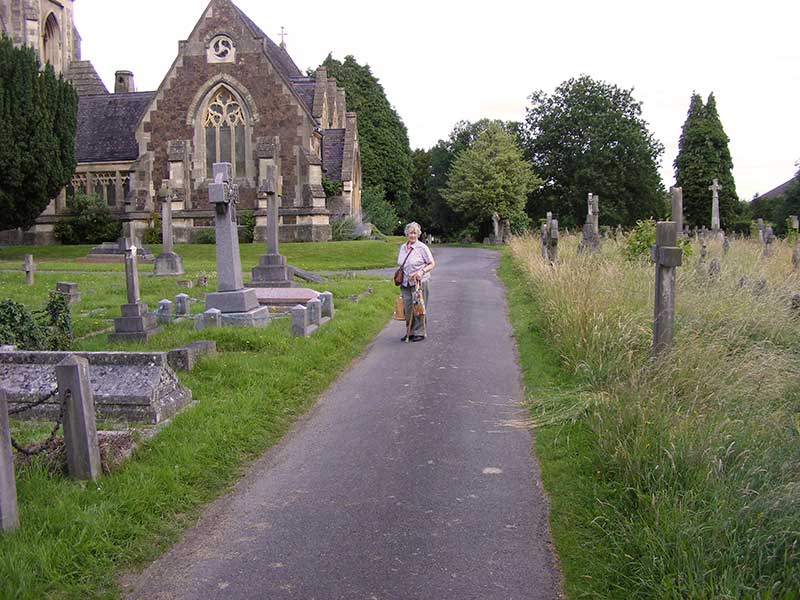
Path from Wilton Road entrance leading to Anglican chapel
The photo above was taken on the path leading from the
Wilton Road entrance to the Anglican chapel. The stone cross in the
foreground on the right of the picture is the memorial to Thomas Rayner MD.
Further along, where the path next turns to the right, we literally stumbled across
the headstone of Archibald Weir MD, lying flat, hidden in long grass.
The grave of photographer Norman May,
founder of Norman May's Studio in Church Street, could not be located. At
the time of our visit, the grass in the south east corner of the cemetery,
where he may be buried, had grown very long, creating a significant
risk of tripping on both the uneven ground and unseen stones, thus making it
almost impossible to locate inscriptions except for those near the edges of the path.
Subsequently the cemetery manager very kindly located
Norman May's memorial for us and details can be found in tour 6.
Index
Victor W Price RAF
Laurence Henry Holland
Edmund Wallace Elmslie
Richard Cope
John Robert Bartleet
Archibald Weir MD
Thomas Rayner MD
Henry Templeman Speer
Rev William Grundy
Henry Geoffrey Curwen Salmon
Foster family graves
Victor Hume Moody
Victor William Price was killed in a flying accident in
1917. It would seem his original grave marker has been replaced by a
memorial to both him and his nephew Neville Bellamy who died in 1923 aged
only 6 years.
Click to view their memorial which we have listed on tour 2.
Next to the grave of Neville Bellamy and Vincent William
Price is a touching memorial to teenager Laurence Henry Holland who was a
pupil at Malvern College.
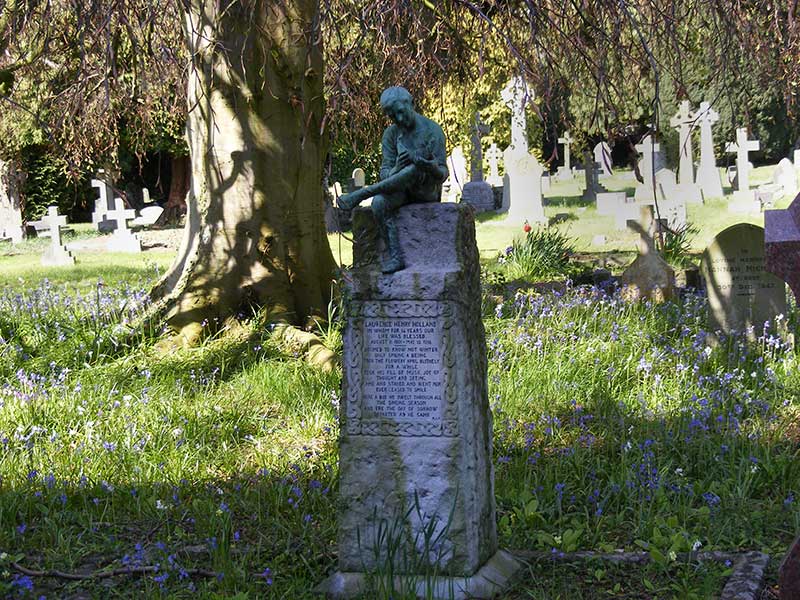
The inscription, which is based on verse by Rober Louis
Stephenson, reads:
Laurence Henry Holland
In whom for 14 years our life was blessed
August 11th 1901 - May 15th 1916
Doomed to know not Winter, only Spring, a being
Trod
the flowery April blithely for a while,
Took his fill of music, joy of
thought and seeing,
Came and stayed and went, nor ever ceased to smile
Here a boy he dwelt through all the singing season,
And
ere the day of sorrow, departed as he came.
RLS
Laurence's death was reported in the Times on 17th May
1916 thus:
Holland, at Malvern College. Laurence Henry Holland son
of the late Capt HC Holland and Mrs Holland. Funeral 10.30 am today
(Wednesday). No flowers by request.
Sadly, his father Herbert Christian Holland, Chief
Constable of Derbyshire, had died only a fortnight before. The Times had reported on
5th May 1916.
Holland, on 3rd May at Buxton, Captain Herbert Christian
Holland, Chief Constable of Derbyshire, aged 57. Funeral at Buxton 3 pm
today (Friday). No flowers by request.
Laurence was survived by his mother and three brothers.
Click to read about architect Edmund Wallace Elmslie who we have now
listed on tour 1.
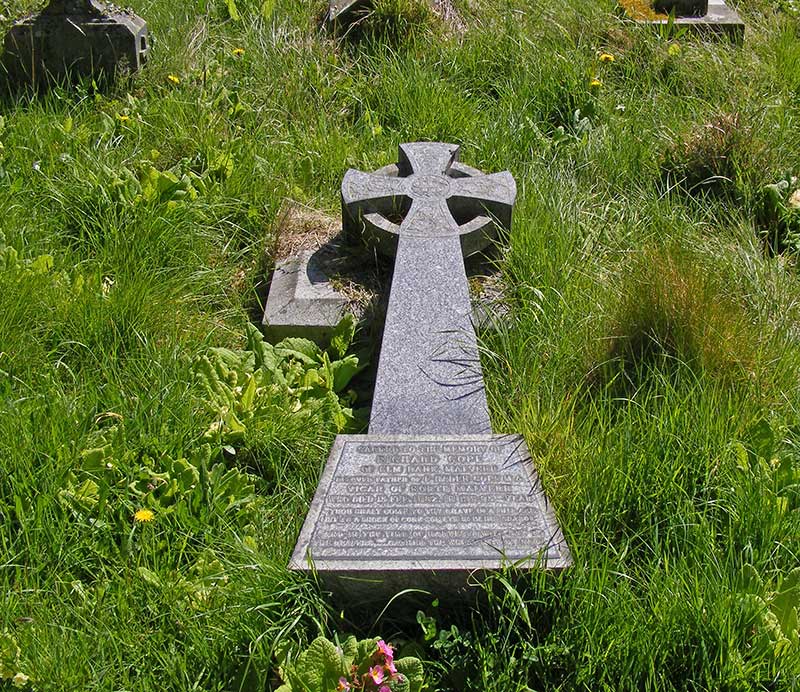 The
tall memorial to Richard Cope now lies flat. The
tall memorial to Richard Cope now lies flat.
The inscription reads:
Sacred to the memory of Richard Cope of Elm Bank Malvern, beloved father
of F Haden Cope Vicar of North Malvern, who died 15th Feb 1882 in his 95th
year.
Like as a shock of corn cometh in in his season, and in the time of
harvest I will say to the reaper, gather the wheat into my barn.
St Matt XIII 30
Richard Cope had been a wine and spirit merchant in the city of Manchester;
his second son Thomas Berwick Cope also became a wine merchant; youngest son George
Harwood Cope became a Lt Col in HM Army.
To the left of the footpath approaching the chapel, near
the grave of Rev William Povey (numbered 7 on the
plan), is a large monument in the form of a cross,
which is slightly leaning over.
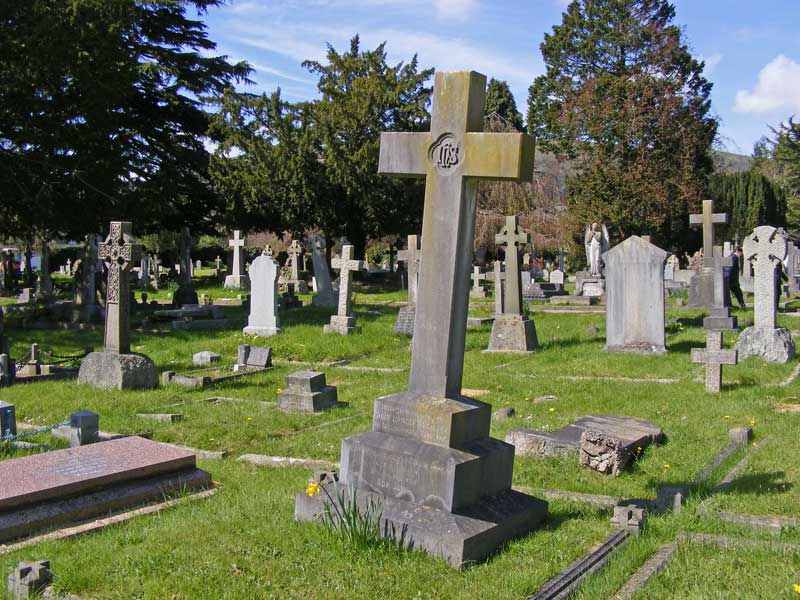
The inscription reads:
In loving memory of John Robert Bartleet of
Hillborough, Malvern, who fell asleep August 8, 1902 aged 65 years.
And of his wife Ada Jane
Hillborough may have been one of a number of Victorian
mansions in Tibberton Road; can you remember where it was and what it is
called now?
John Robert Bartleet was the youngest child of William Bartleet of Harborough House, Edgbaston, and the uncle of Canon
Humphrey Middlemore Bartleet (1869 - 1961) vicar of Malvern from 1924 -
1947. His grandfather had founded a business named W Bartleet and Sons
at Redditch which manufactured needles and fishing tackle. The business was
continued and expanded by his elder brother
Ronald
Smith Bartleet, magistrate, and Deputy Lieutenant of Worcestershire. The
family business must have been a significant venture as it is mentioned by
the Australian Museum of Victoria; see Piesse, J (2008) Robert Smith
Bartleet, Needle & Fishing Tackle Manufacturer, in
Museum Victoria Collections.
At that time Redditch was a major centre for the manufacture of steel
needles; the needles were sharpened on a grindstone, and the life expectancy
of those sharpening the tips, was greatly reduced by breathing in dust, as
was that of men sharpening knives in Sheffield.
We wondered if Victorian families were showing their
status by purchasing such large memorials for their loved ones.
Archibald Weir MD has on the otherhand a relatively small memorial on
the opposite side of the path (numbered 5 on the
plan), which sadly has toppled and now lies hidden
in long grass. How marvellous it would be if his memorial could be restored.
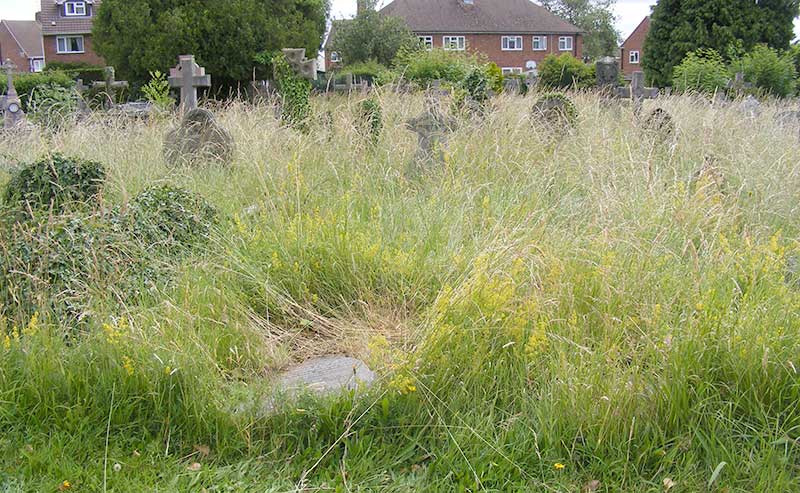
Photo showing location of Archibald Weir's headstone
The burial register records that Archibald Weir, surgeon,
aged 65 of St Mungho's, Malvern was buried on 21st May 1894 in plot 1621.
The burial service was conducted by Rev George Cosby White, vicar of Malvern
Link 1876/77, who became the second warden of the Beauchamp Almshouses and
Vicar of Newland (1877 - 1897).
Rev George Cosby White MA born London 1825, educated
Trinity College Cambridge died at Clevedon, Somerset on 6th December 1918
aged 93 years.
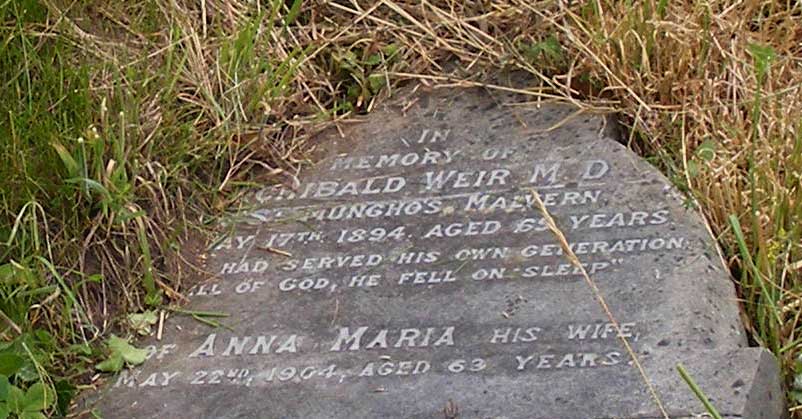
Close up of inscription
Archibald Weir's epitath based on Acts chapter 13 verse 36 reads:
In memory of Archibald Weir MD of St Mungho's
Malvern, died May 17th 1894, aged 65 years.
After he had served his own generation
By will of God, he fell on sleep
And of Anna Maria his wife
Died May 22nd 1904, aged 63 years
Archibald Weir had in fact married three times, and so
Anna Maria was his third wife. To the right of his headstone, hidden deep in
long grass, is a smaller memorial to his second wife Fanny Elizabeth nee
Munday who is said to have died of diptheria. Her epitath
reads:
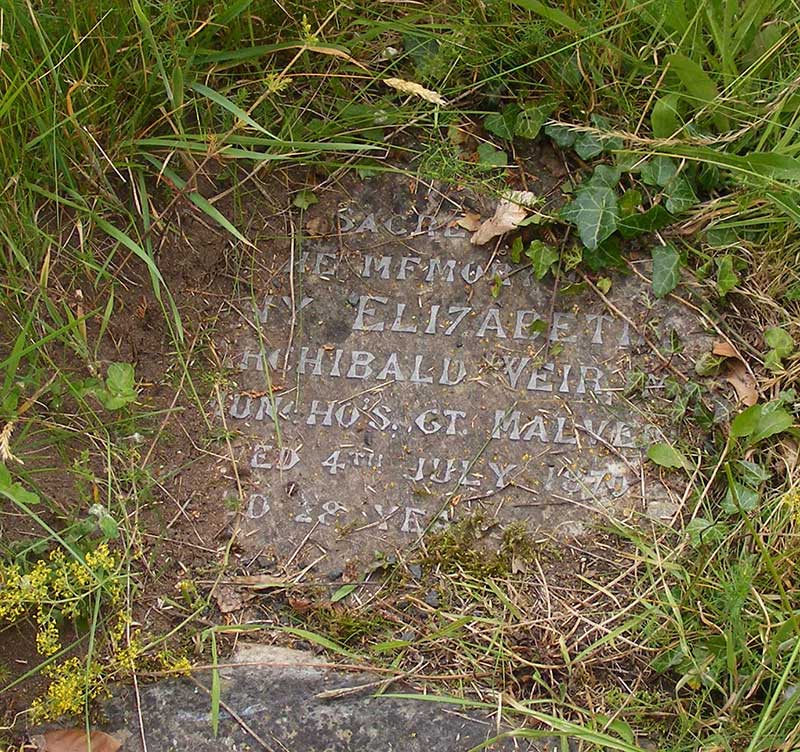 Sacred
to the memory of Sacred
to the memory of
Fanny Elizabeth
wife of Archibald Weir MD
of St Mungho's,
Great Malvern
died 4th July 1870
aged 28 years
Archibald had married his first wife, Louisa Abigail
Hawkes at Kidderminster in 1855; sadly she died at Malta only a year later.
He was then serving with the Highland Garrison in Malta where some
casualties of the Crimean War were being treated.
The
website of the
Regimental Surgeons of the Malta Garrison records:
Louisa Abigail Weir aged 23 years, wife of Acting
Assistant Surgeon Archibald Weir was buried at Malta on 29 April 1856 by the
Rev Henry Hare, Chaplain to the Forces.
Archibald Weir's story is told on our page about architect
Edward Elmslie who sold him St
Mungho's, which is a large Victorian residence standing on the corner of
Albert Road and Avenue Road. St Mungho's was eventually sold to Lawnside girls' school
and renamed the Grove; it has recently been modernised to a high standard and is now known
as Elmslie House (see photo below).
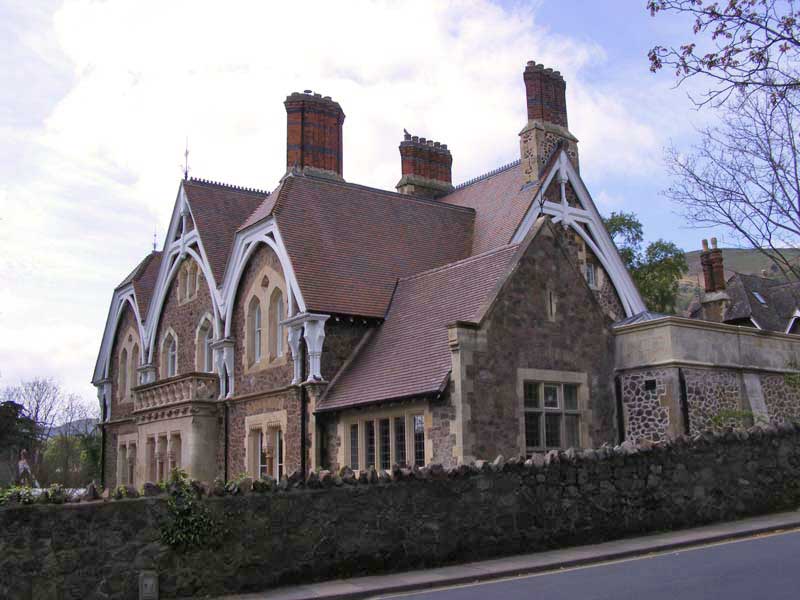
Elmslie House, formerly St Mungho's
Set into the north face of the house is a sandstone plaque containing the lettering
AW
1867
Click to read more
about Archibald Weir MD.
Archibald's son, Archibald Munday Weir (1865 - 1910), became a physician and surgeon like
his father and worked in Malvern Link.
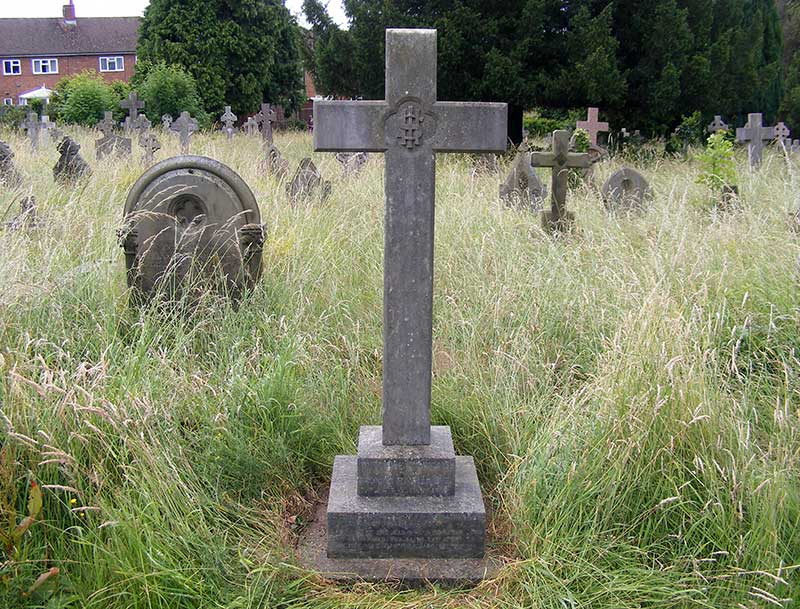 Thomas
Rayner MD is buried alongside the path from Wilton Road to the chapel (see
number 5 on the plan). He took over running the Hydropathic Establishment
following the death of its founder James Wilson MD in 1867, and continued to
run the business successfully until his death in 1892. Thomas
Rayner MD is buried alongside the path from Wilton Road to the chapel (see
number 5 on the plan). He took over running the Hydropathic Establishment
following the death of its founder James Wilson MD in 1867, and continued to
run the business successfully until his death in 1892.
Click to read
Thomas Rayner's story
Henry Templeman Speer was the elder brother of merchant Alfred Mile Speer
who built Priory Park Mansion and
is buried next to Jenny Lind.
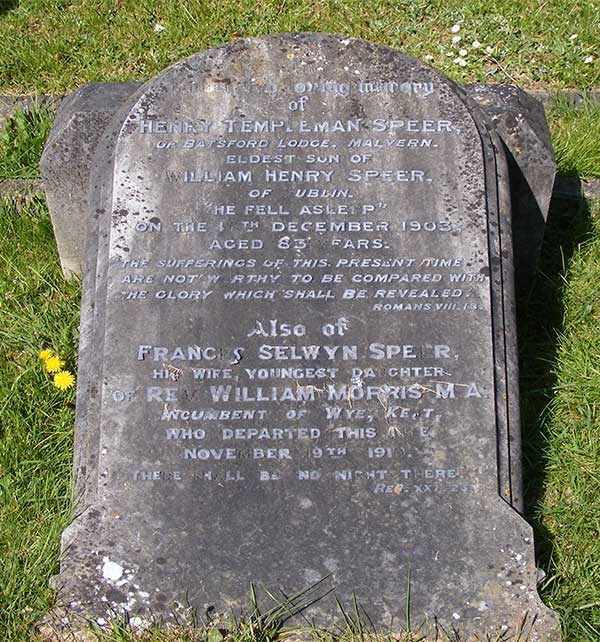 Henry
and his wife are buried alongside the footpath from Wilton Road to the chapel (numbered 7
on the plan). The inscription reads: Henry
and his wife are buried alongside the footpath from Wilton Road to the chapel (numbered 7
on the plan). The inscription reads:
In loving memory of Henry Templeman Speer, of Batsford Lodge, Malvern,
eldest son of William Henry Speer of Dublin.
He fell asleep on the 4th December 1903 aged 83 years.
The sufferings of this present time are not worthy to be compared
with the glory which shall be revealed
Romans VIII.13
Also of Frances Selwyn Speer, his wife, youngest daughter of Rev
William Morris MA, incumbent of Wye, Kent, who departed this life November
19th 1910.
There will be no night there.
Rev XXI.23
Henry Templeman Speer had various business interests in
Liverpool, but seems to have sold up and retired to Malvern about 1871. The
census records Henry and Frances Speer living at Batsford Lodge on the
corner of Avenue Road with Imperial Road. The house is still there.
Rev William Grundy, headmaster of Malvern College between 1885 and 1891,
died at the school aged only 41 years.
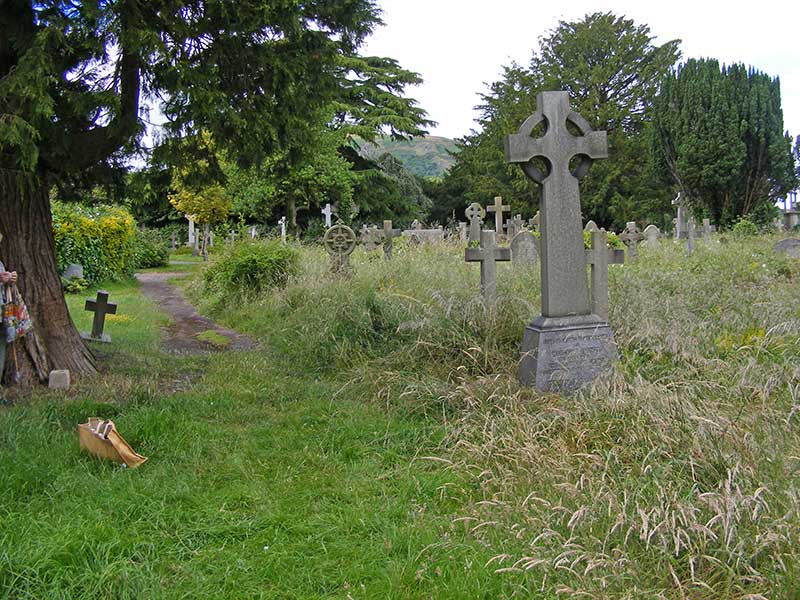
Location of Rev William Grundy's memorial
His memorial, numbered 4 on the
plan, can be found alongside the path
running below the cemetery office.
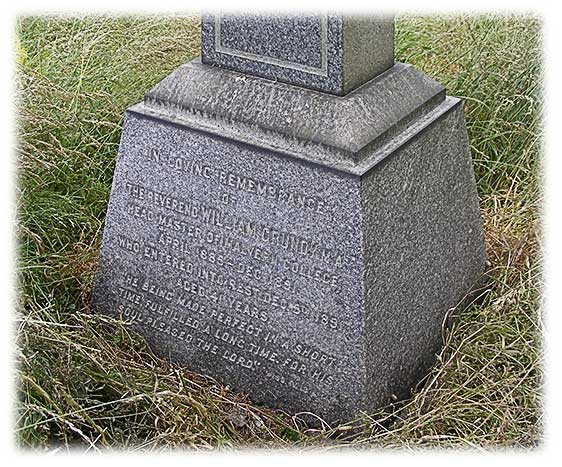 The epitath on the west side of the base reads: The epitath on the west side of the base reads:
In loving remembrance of the Reverend William Grundy MA
Headmaster of Malvern College, April 1885 - Dec 1891, who entered
into rest December 5th 1891 aged 41 years.
He being made perfect in a short time, fulfilled a long time, for his
soul pleased the lord.
WISD IV.13
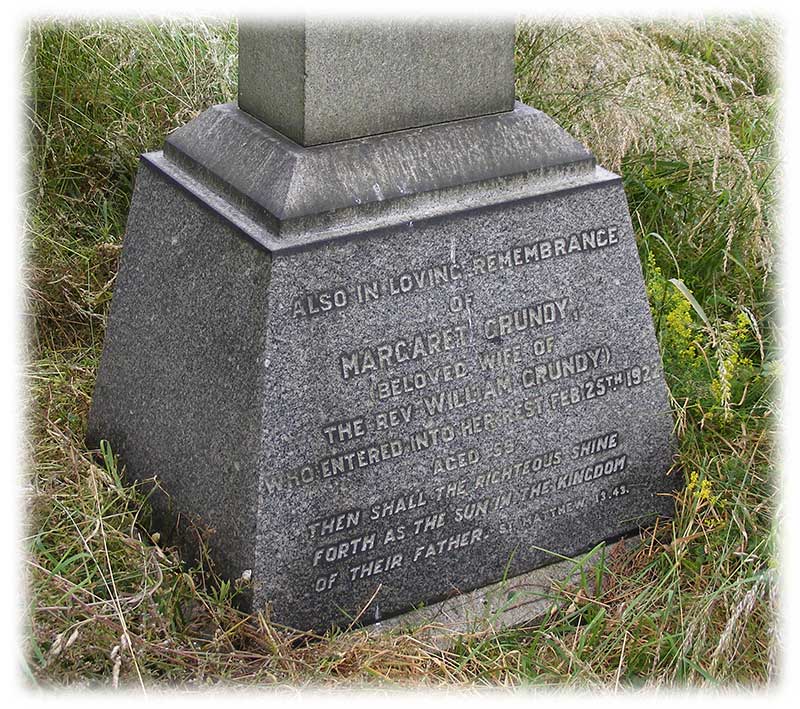 The
epitath on the other side of the base reads: The
epitath on the other side of the base reads:
Also in loving rememberance of
Margaret Grundy
beloved wife of the Rev William Grundy
Who entered into rest Feb 25th 1922 aged 68
Then shall the righteous shine forth as the sun in the kingdom of
their father.
St Matthew 13.43
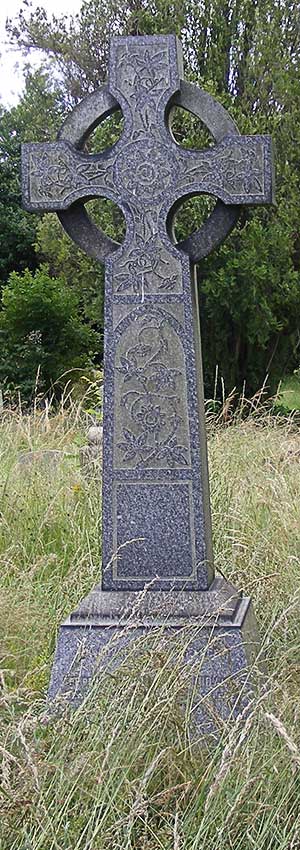 The cemetery burial register records that William Grundy,
College Master, of the School House, Great Malvern, aged 41 years, was buried
on 10th December 1891 in plot 2011; the funeral service was conducted by Rev
Dr Isaac Gregory Smith, vicar of Great Malvern 1872 - 1896. The cemetery burial register records that William Grundy,
College Master, of the School House, Great Malvern, aged 41 years, was buried
on 10th December 1891 in plot 2011; the funeral service was conducted by Rev
Dr Isaac Gregory Smith, vicar of Great Malvern 1872 - 1896.
An earlier entry recorded the burial of William's mother
Charlotte Grundy, married, aged 75 years, of the School House, Malvern
College, on 9th January 1888 in plot 6195. The funeral service was conducted
by Rev EH Ball.
William's father died not long after in the December of 1888 and was
buried at Richmond; he was Rev William James Grundy who was briefly Rector
of Kilvington in Nottinghamshire, and then Perpetual Curate of St James the
Less, Bethnal Green.
William's brother James Grundy is described in the 1911
census as a minister, of the catholic apostolic church; he was married with
three children born in Chicago, and then living in Liverpool.
At the time of his death William was married with four
children and another on the way. Ten years later his wife was still living
in Malvern at Heathcote in Thirlestone Road, with her sister Flora Mitchell,
and children. By 1911 she was living with her daughter Mary in a house,
again named Heathcote, by the sea, at Bexhill.
William and Margaret's eldest son
William Mitchell Grundy became a schoolmaster like his father and was
headmaster of Abingdon School (1913 - 1957). He too named his home
Heathcote.
Tribute
The Malvern Advertiser, Saturday 19th December 1891, published an
extremely lengthy tribute. Here is a transcription:
The late Rev W Grundy
On Sunday evening, December 13th, the funeral sermon was preached in the
College Chapel by the Very Rev HA James, Principal of Cheltenham College,
whose text was 'A Wise Master Builder' (1 Cor iii 10).
We insert the discourse in full:-
St Paul is speaking of the work he had begun at Corinth during that
fruitful eighteen months which he spent there on the occasion when he found
the first Christian Church on that uncongenial spot on earth.
Longer he
might not stay, for other work in other cities called him away; and he must
leave it to others to build upon his foundation, to finish what he had
commenced.
So he felt it keenly when, in his absence from them, he heard
that these others were not working on his own lines, were not keeping to the
one true foundation which he had laid, were building a superstructure that
was unworthy of his beginning. And he warns them, in solemn yet loving
words, of the terrible responsibility that lies upon all whose spiritual
masonry is untrue, and will not bear the test of time and wear.
Remember
what St Paul had had to do; it was to take as it were at random, a number of
human souls congregated together in this pleasure-loving city, and to form
them into one great living and holy temple for God's Spirit to dwell in, and
what he did not only at Corinth but in a score of other cities, that
everyone, who aspires to be a spiritual builder, must try to do, be he a
statesman, or clergyman, or school-master.
And look how much more difficult
his task is than that of an ordinary builder. The builder takes his stones
and beams, and sets them one upon another until his building is complete;
and if one or another does not fit as he finds it he uses chisel or plane
and pares it down until it does. But the spiritual builder has not to deal
with stocks and stones but with human hearts; and human hearts will bear no
such rough usage.
They must be moulded with all tender and delicate
handling, if they are to be compact together into one great whole. Not by
force, not by violence and compulsion can these souls of ours be brought
into the divine harmony of a true spiritual temple. To drop the metaphor, if
a nation, or a church, or a school is by the labour of one who is set over
it to be so filled with the spirit of Christian unity and love that every
member of it will do his own duty in his own place. brother helping and
supporting brother; each one thinking less of himself than of the body to
which he belongs and of the Master who has given him his place in His Church
and his mission in the world; then it is necessary indeed not only that he
who has to bring about this state of things should be wise, prudent, and
skilful, but that he should have a heart that can sympathise with other
hearts, that he should know their nobler side the better to cherish and
develop it that he should feel towards evil not as a judge does toward crime
but as a healer does towards disease, remembering always that in the souls
of men the good and evil grow up side by side and cannot be mechanically
separated.
Such a man must win others to himself, attract their love and
respect and that not simply that he may enjoy them and use them to make his
own life happier but that he may draw his brothers to climb with him bravely
and cheerfully 'the world's great altar stairs that slope through darkness
to God'.
It is an easy thing comparatively to create some sort of feeling of
unity. In the worst of schools at the worst of times there is often in the
hearts of many of its sons a pride in their School, a love of their House.
But that is not enough: this affection this spirit of brotherhood needs
placing upon a true basis must spring from a right source.
Unless right down
at its roots and foundations there lies a scorn for what is wrong, and mean
and impure, and shifty and false and bad; unless through it and in it
everywhere there runs a penetrating love and desire for what is true and
strong and clean and generous and gracious and lovable; it might almost as
well not exist at all.
No doubt every self sacrifice every act of self
surrender for the sake of the body to which we belong, has its value; but
that value is intensified a thousand-fold if it is a sacrifice for something
nobler than ourselves; best of all is it if it is a surrender to Christ. And
there is no higher task in all this world than his who can win his brothers
to make it.
You will know why it is that I am saying this and of whom it is
that I am thinking. Indeed there is but one thought that fills all hearts
here tonight.
He had that secret of all true creators and
reformers, that he changed without seeming to change. Living so near to him,
having him so close and so accessible it never occurred to you, perhaps,
while he lived, to make a hero of him; and now that he is gone you begin to
realise what he was to you and to Malvern.
No doubt many things about him
will 'leap to light' now, which will help you to form a true estimate of his
character; and if tonight I who knew him well, long before he came to you,
who was set over his old school of Rossall (it was full of traditions of him
when I went there, though he had left it five years before) who followed his
career and enjoyed his confidence at both the schools over which he
presided, - if I can contribute anything to such a judgement and above all
can do anything to make you follow his example and carry on his work I shall
be rendering the last service I can to a man whose friendship I valued above
that of most men, and a service to possibly to the College this living
temple which he loved so well.
He struck the keynote of his life at school.
His schooldays were no pleasant saunter over summer fields like those of
some boys. I need make no secret about it for he did not: he was poor, the
son of a clergyman who could afford at that time but little to help him at
the University. But to the University he resolved he would go and that meant
he must not only win an open scholarship at some college there but gain also
the one school exhibition in the year when he left Rossall. He had those two
aims in front of him from the first. He was over 16 when he went to school
and he went there untrained and backward in acquirements, and at entrance he
was placed in so low a form that it seemed almost impossible that that he
should ever reach the top in time. But it was characteristic of his
indomitable will that he never knew what it was to despair or to be beaten.
Every leisure moment (except now and then when he was playing the games
which he enjoyed with so keen a zest) was given to his work; and I have
heard him say that until the end of the summer term, when examinations were
over, he never knew what it was to have an idle hour at school; and he
described the utter delight with which in those few bright summer days he
would lie in the long grass reading poetry.
And this toil brought its
reward. He won the prizes that were necessary to take him up to Oxford and
at the end of his career he was a Fellow of his College. Then I asked him to
come and help me at Rossall where there was a tough battle to be fought
against difficulties within, and prejudices without. He was glad to come to
his old school again and that for more than one reason.' I think', he said
to me, long afterwards,' if I had stayed on at Oxford I might have got
idle'. He was far too active minded a man to have done anything of the sort;
but what he felt, I dont doubt, was that he was more at home in the
practical, busy, crowded life of a public school than he would have been in
the more purely literary atmosphere of the Oxford Common Room.
It was no
drawback to this that his chief intellectual interests were philosophical
rather than linguistic. He brought all that strong but subtle intellect
which loved nothing better than to solve some difficult problem, whether it
were in logic or at chess to bear upon the problems of life and the
reading of character.
And so he became a schoolmaster and threw himself at
once, in his characteristic way into each and all the varied sides of
boy-life: its work, its games, its higher interests. It was at this stage
that he was ordained, and neither you nor I probably will forget his sermons
plain spoken even to quaintness, yet full of thought and force and
originality. 'Fellows shan't go to sleep, anyhow, while I am preaching', he
said to me once.
After a short two or three years of this work he left us.
It was in this year that he took two great steps in his life his marriage,
and his first headmastership. You who saw something of his home circle, know
well what the sanctity of domestic life was to him, how the husband and
father in him were leading elements of a fuller manhood. I cannot trust
myself to speak of this side of him; but you will pray, I know, for the
loved and loving wife and the fatherless children who have lost even more
than you have.
Nor need I dwell upon his work at Warwick how he threw
fresh life and vigour into a school which he found languishing and
depressed, to leave it after five fruitful years, permanently flourishing
and prosperous.
Then he came here; not without much misgiving I remember
for he was leaving a place where the meed of success was his already, where
he had won men's trust and high regard; and he was coming to a new sphere of
unknown conditions and untried hazard. But he loved work and delighted in
difficulty; and he had his face to the sky always: knew indeed, that
To him
who works, and feels he works
The golden year is ever at the doors
I need
not speak to you who know it better than I do about what he did for Malvern.
Neither you nor I can realise all that he had to face and to go through to
win the victory he has won. In disappointment and discouragement often,
through misjudgement and depreciation at times, but always in hope, always
in faith, always trusting to the future in which he believed, he sowed the
seeds for a true success. Through the bitter springtime and the sultry
summer of his task he watched and worked; and then just as the golden crop
ripened to harvest and he began to gather the fruits of his toil, the sickle
fell from his hand and the Master called him to rest.
No need, indeed that
I should speak of his work here; you are his best and truest monument; and
on your hearts and minds are written the one the only epitaph for which he
would have cared. Yet some of his qualities which enabled him to do what he
did I may recall; the spirit of truth-speaking and straightforward honesty
which marked him; the loyal faith which bound him to his word; the generous
heart which never grudged even to a rival or opponent his meed of praise
which never suffered a word of unkindness or depreciation of others to pass
his lips, and made him one of those of whom it has been said that:-
Ridicule, against them hurled,
Drops with a broken sting and dies;
Who,
nobly, if they cannot know
Whether a scutcheon's dubious field
Carries a
falcon, or a crow,
Fancy a falcon on the shield;
(lines by poet Coventry Patmore)
of the liberal hand which
(partly doubtless, because he remembered how others had helped him) was open
always to render assistance to those who needed it for their start in life;
of that blending of a strong will with the gentlest sympathy that made you
fear him while you trusted him; of that loyalty to duty, that devotion to
his work and the body to which he belonged, which marked him to the very
end.
And what is his reward and the outcome of it all? It may be this:
years hence a boy will come to this College, of whom when he comes no one
can say whether he will be God's servant or the devil's. And one day the
choice will come to him in a moment, without warning or preparation, to
serve one of these masters or the other, and he will choose for the right,
he will swear the soldier's oath that binds him to Christ, he will go out
into the world with the stamp of the Christian upon his heart and that
because one man, who never saw him, or heard his name, was true to his place
and to his duty.
But I only said his reward may be this: I did not say it
will be. For that Masters and Boys of Malvern, let my words sink into your
heart of hearts tonight that lies, in part at least, with you. He is gone;
the voice that would have reasoned with you today or next Sunday of
righteousness, temperance, and judgement to come is hushed forever. There
comes a time of transition and of crisis, a time the most dangerous to all
schools, a time when fond memories go back sadly upon the past, when little
changes are apt to be resented, when round the new leader the loyalty has
not yet had time to form. Remember when that time comes that if you would be
loyal to the dead chief, if you would carry on his work indeed, if you would
hand on the lamp that he kindled and passed to you, you must be thoughtful
and unselfish and vigilant.
You boys who are the oldest and highest with
you mainly it lies now whether there shall be a break or a check in the
history of the history of your College, or whether, like your own Severn
amid its green meadows, it shall flow on to the eternal sea with ever
swelling tide. Prefects and head-boys of this College, I charge you tonight,
and I charge you in his name, and in his Master's, to be true to be faithful
in these coming months.
I want you tonight, as you kneel by your bedside, to
ask the God of your boyhood to grant you to play the man in these days of
crisis and of peril. We who cannot help you, but can only pray for your
welfare, shall watch with eyes of hope and of trust that on this sudden and
gloomy night shall arise a dawn radiant with promise and with light. Make it
true once more as has been true a thousand times.
(next para not
transcribed)
It was on Saturday morning that the head had been taken from
us, but the strain of the work of the last five years upon a frame, which
never had perhaps been very strong, had told, and there was a failure of
rallying power when the illness induced by a chill, came.
The blow has come
with stunning force upon the school, which can hardly as yet realise the
loss which it has sustained The strong personality which made itself felt
throughout, the sense of justice upon which the boys relied, the readiness
to identify himself with the interest of the school in the playground, the
self reliance in a school crisis were qualities recognised by all.
As a
colleague, men felt that a difficulty could always readily be brought to
him, and they felt grateful for the opportunities of access which he
encouraged. They felt the liberality with which he judged of others, and the
generosity which he invariably acted towards the school.
Few men have so
quickly seen the results of their work. Coming at a time of difficulty and
when the school was less than 200 boys, the Head Master handed it over to
his successor with the numbers over 300.
We must not close these few words
without expressing our deep sympathy with Mrs Grundy and the other members
of the family upon whom the blow has fallen so swiftly.
Commenting upon the
decease of the late Headmaster of Malvern College, Truth says that Mr Grundy
was 'an excellent teacher, and he possessed Arnold's capacity for
discovering zealous and thoroughly competent assistants'.
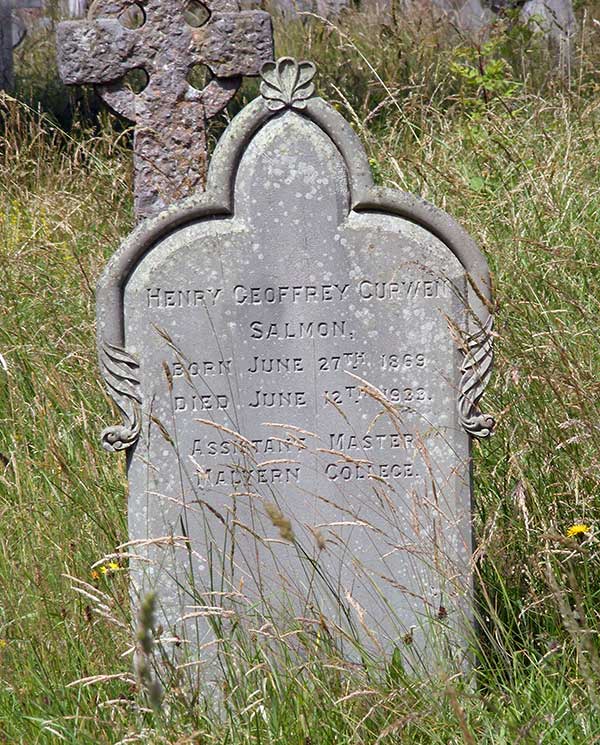 We
followed the path from Rev William Grundy's memorial, around the boundary of
the cemetery, and found a memorial to another school master (near 4 on the
plan). The inscription reads: We
followed the path from Rev William Grundy's memorial, around the boundary of
the cemetery, and found a memorial to another school master (near 4 on the
plan). The inscription reads:
Henry Geoffrey Curwen Salmon
Born June 27th 1869
Died June 12th 1933
Assistant Master Malvern College
Bachelor Henry Geoffrey Curwen Salmon was born at Manchester and educated
at Merchant Taylors School and Jesus College Oxford.
More about him can be found in a quotation from from the collected letters of CS Lewis:
Henry Geoffrey Curwen Salmon (1869 - 1933) was known to pupils as 'The
Fish'. He went up to Jesus College, Oxford in 1888 on a Classics
scholarship. He joined the staff of Malvern College in 1901 and taught
French and German to to the 6th form. In 1914 he helped prepare the third
edition of the Malvern Register and he was entirlely responsible for the 4th
edition in 1924. When he retired from teaching in 1929 he was appointed
secretary of the Malvernian Society, which work he undertook with enthusiasm
for the rest of his life.
In 1911 he had been lodging with two other
schoolmasters at Heathcote in Thirlestane Road.
Family
Henry's elder brother Arthur John Balliol Salmon (1865 -
1953) was an artist, becoming a full time illustrator for
The
Graphic illustrated newspaper in about 1901. He worked for most of the
major black and white magazines of his day and was considered by some to be
one of the best pencil and chalk artists of period. His works bear the
signature 'Balliol Salmon' and a book has been written about him, 'The art
of the illustrator - Balliol Salmon and his Work', by Percy V Bradshaw,
1918.
Balliol Salmon has an entry in Who's Who that suggests
his father Henry Curzon Salmon (1829 - 1873) was a Barrister, but we have
found no evidence of that. The 1871 census records him as a Civil Engineer,
and other documents refer to Henry Curwen Salmon FCS FGS as a Mining Agent,
who was editor of the Mining and Smelting Magazine, a monthly review of
practical mining, quarrying and metallurgy. The abbreviations following his
name possibly refer to 'Fellow of the Chemical Society' and 'Fellow of the
Geological Society'.
Mother's family
Bob Gamble sent us this piece about Henry's extended
family. Quote:
I thought you might be interested to learn a little more
about Henry Salmon's antecedents. As you rightly say, his mother, Ellen Jane
Fennell b.1838, was the daughter of a clergyman. The cleric in question was
the Reverend John Fennell (1762-1841), minister at St Paul's, Cross Stones,
Todmorden, near Halifax in West Yorkshire.
Ellen was Rev John's fourth child by his second wife
(Elizabeth Lister) who he married in 1830 at the age of 68. Ellen
married Henry Curwen Salmon (who I understand to have been a
civil engineer) and had 6 children of her own.
The Reverend John Fennell is
notable as the great uncle of the Bronte sisters, who stayed with him in
Cross Stones in 1829. John's first wife was Jane Branwell - they were uncle
and aunt to Maria Bronte nee Branwell, wife of the Reverend Patrick Bronte
of Haworth (the parents of the famous siblings). John Fennell gave his niece
Maria away at a double wedding in 1812 in Guiseley (John and Jane's daughter
- Jane Branwell Fennell - married Patrick Bronte's great friend, The
Reverend William Morgan, at the same ceremony). John Fennell met his first
wife Jane while teaching in Penzance, Cornwall, and it was their move to
Yorkshire which lured both Maria and Patrick to the area. So Henry Geoffrey
Curwen Salmon was the grandson of a rather important figure in the Bronte
saga. I am a member of the Bronte Society and write articles for its
official research journal, 'Bronte Studies'.
Further along (numbered 4 on the
plan) you will find graves of the
Foster family who were well known sportsmen, as was their father Rev Henry Foster, a
house-master at Malvern College. Their graves have recently been restored by
Malvern Civic Society
Their inspiring story is told in the publication 'Malvern
College, a 150th Anniversary Portrait' and more can be found on the
Foster
website.
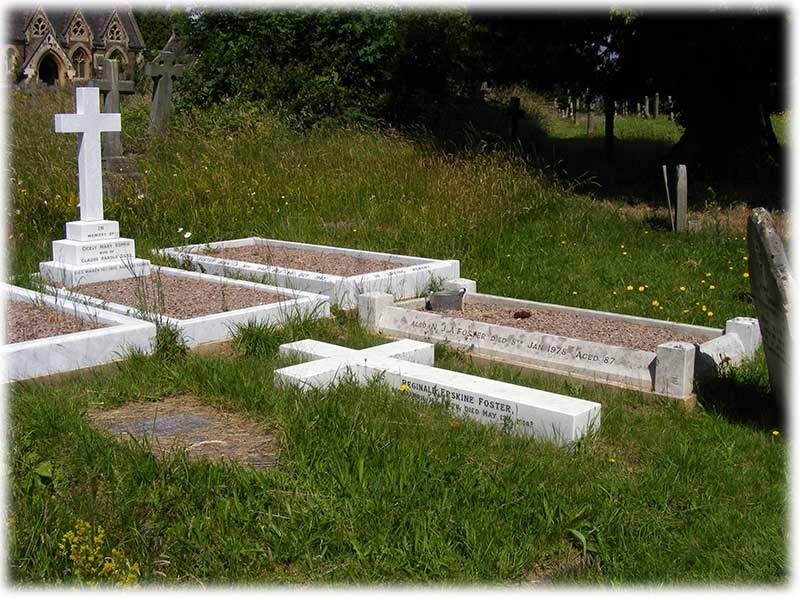
Foster family graves
As we walked from the chapel back to the car park we passed the grave of
Victor Hume Moody.
Victor Hume Moody (1896 - 1990) was a significant painter
in modern times. He came to Malvern about 1935 to become Head of the
Malvern School of Art which had come into being about 1886. The building in Victoria Road still has an
art department but is now part of
South
Worcestershire College.
Victor Hume Moody was Head of the Malvern School of Art between 1935 and
1962.
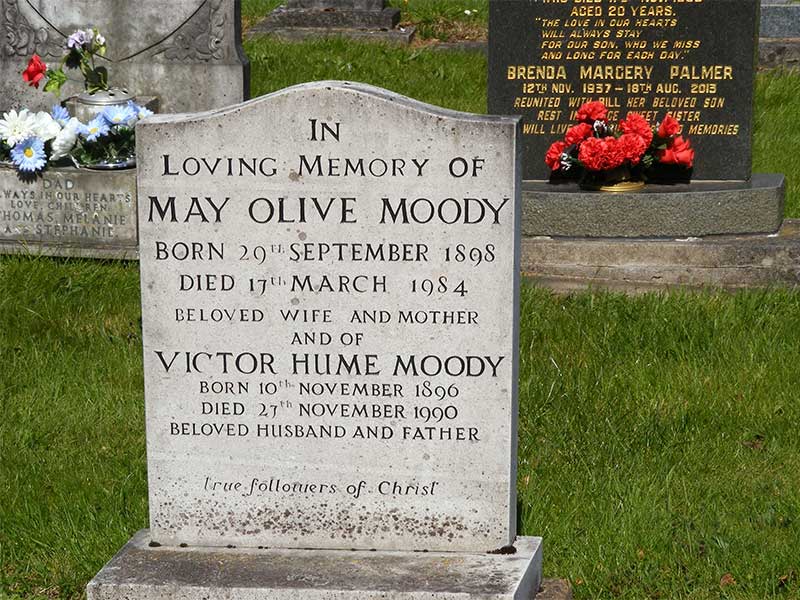
The memorial reads:
In loving memory of May Olive Moody born 29th September 1898, died 17th
March 1984, beloved wife and mother.
and of,
Victor Hume Moody born 10th November 1896, died 27th November 1990,
beloved husband and father.
True followers of Christ
Their daughter
Catherine Moody (1920 - 2009) became a Malvern artist and, like her
father, was a President of the Malvern Art Club and head of Malvern School
of Art (1962 - 1980). Her obituary was published in the Priory magazine -
it's worth reading, and you should be able to find a copy on the
Liss Llewellyn Fine
Art website. Catherine was author of 'Silhouette of Malvern' published in
1953, a lovely little book, which inspired us to explore the history and
architecture of the houses in Abbey Road.
References
- The Times Digital Archive
- England and Wales census
- Great Malvern Victorian Cemetery, printed by Aspect Design 2013 (a
booklet published by Malvern Civic Society).
- Oxford Dictionary of National Biography.
- Who's who
- Malvern Gazette, microfilm archive, at Library
- Newseum, a publication of Malvern Museum
- Great Malvern cemetery burial register
- National Probate Calendar
 Continue
to tour 5 Continue
to tour 5
Go to
Menu of tours
Back to top
If you are able to correct or add to the stories on this
page please get in touch by contacting the webmaster
|



 The
tall memorial to Richard Cope now lies flat.
The
tall memorial to Richard Cope now lies flat.


 Sacred
to the memory of
Sacred
to the memory of
 Thomas
Rayner MD is buried alongside the path from Wilton Road to the chapel (see
number 5 on the
Thomas
Rayner MD is buried alongside the path from Wilton Road to the chapel (see
number 5 on the  Henry
and his wife are buried alongside the footpath from Wilton Road to the chapel (numbered 7
on the
Henry
and his wife are buried alongside the footpath from Wilton Road to the chapel (numbered 7
on the 
 The epitath on the west side of the base reads:
The epitath on the west side of the base reads: The
epitath on the other side of the base reads:
The
epitath on the other side of the base reads: The cemetery burial register records that William Grundy,
College Master, of the School House, Great Malvern, aged 41 years, was buried
on 10th December 1891 in plot 2011; the funeral service was conducted by Rev
Dr Isaac Gregory Smith, vicar of Great Malvern 1872 - 1896.
The cemetery burial register records that William Grundy,
College Master, of the School House, Great Malvern, aged 41 years, was buried
on 10th December 1891 in plot 2011; the funeral service was conducted by Rev
Dr Isaac Gregory Smith, vicar of Great Malvern 1872 - 1896. We
followed the path from Rev William Grundy's memorial, around the boundary of
the cemetery, and found a memorial to another school master (near 4 on the
We
followed the path from Rev William Grundy's memorial, around the boundary of
the cemetery, and found a memorial to another school master (near 4 on the


